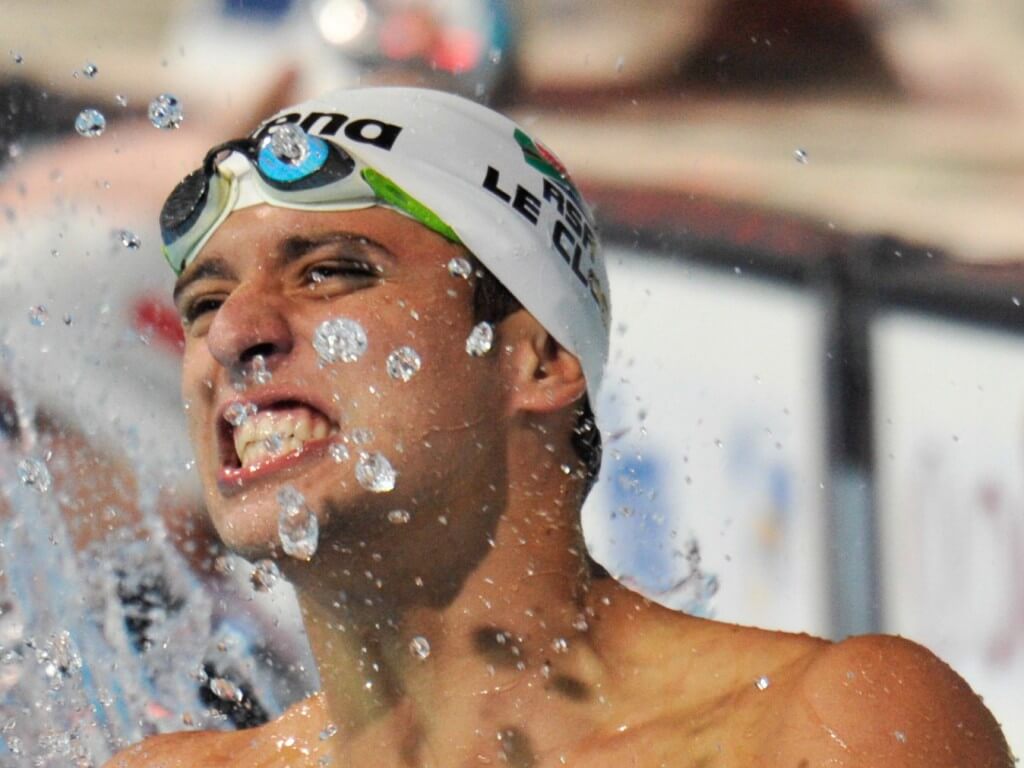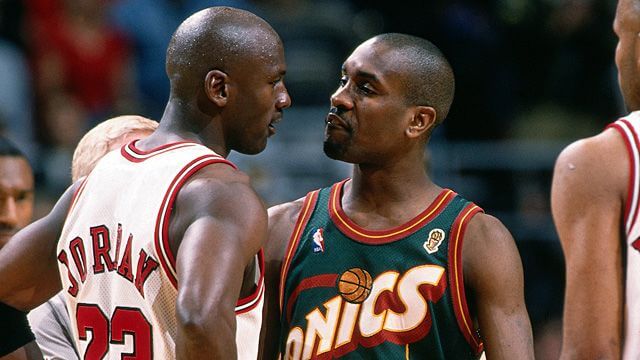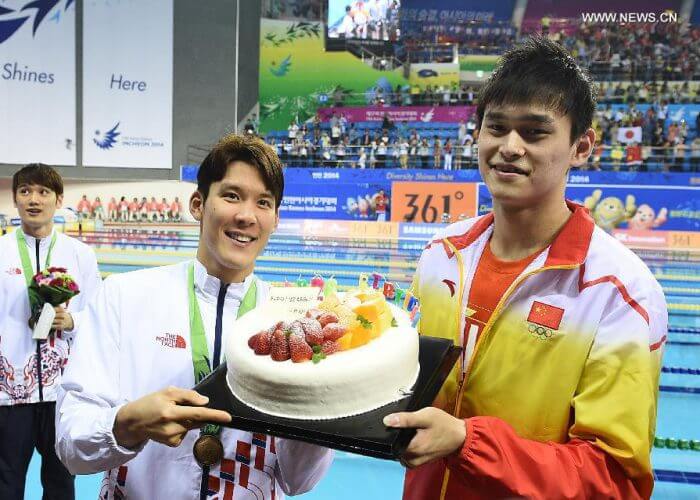Meditation on Trash Talk

By Colin Hogan, Swimming World College Intern
Trash talk: you either love it or you love to hate it.
No matter your opinion on it, big-mouthed banter reigns as the second most competitive element of organized sports, only behind the athletic contest itself. Proudly and unsurprisingly, the fans are the most ruthless trash-talkers because all the unruly bleacher creatures only have so much at stake– pride and the price of their tickets, at the most.
That’s why when the athletes get involved in a snarly exchange, even the most pleasant of spectators grab the popcorn and settle into their seats. Endorsements, contracts, playing time are all on the line. What was previously the field, the pool or the court transforms into the stage. Players are off-script, and we can’t help but be fascinated with the test of character that’s different than the one we showed up to see.

Gary Payton and Michael Jordan, two of the most prolific trash talkers in NBA history. Photo Courtesy: welcometoloudcity.com
For the American sports fan, this is a great time of year. Before the Cubs and Indians finished playing ball late Wednesday night, all four of the largest American sports leagues were operating at the same time. And there’s been plenty of dramatic dialogue to accompany.
Whether you’re a baseball fan in the wrong city or a basketball player back in your old city, trash talk follows sports like Ernie follows Bert.
Usually, swimming escapes the trappings of talking trash, and it’s proud to do so. Why wouldn’t it be? Trash talk is a pastime that’s basically the adult version of bullying. Besides, there isn’t an opportunity at a swim meet for a colloquial exchange with your opponent like in basketball when a defensive assignment requires that you really get to know someone in a different color jersey.
As for the fans, well… the only fan at my swim meets is my mom, and I couldn’t accuse her of anything so vile.
But before we pretend that chlorine does holy water make, let’s remember that in the past year swimming has produced some of the most awesome instances of trash talk in recent memory. And we all ate it up.
For example:
Lovely Lilly and the Finger-Wag Heard ‘Round the World

Photo Courtesy: Dean Lewis / EPA in Los Angeles Times
American breaststroker and Hoosier heroine Lilly King burst into popular consciousness after her comments about the doping allegations against her Russian competitor, Yulia Efimova; then King followed it up with a gold medal performance to boot. But as it goes with speaking the refuse, not everyone was happy about it.
Ms. King found her theater in the pre-race ready room, where broadcasting cameras captured her wagging a Dikembe Mutumbo-like finger at the image of the Russian on a television monitor. In the post-race interview minutes later, she explained her actions saying she was “not a fan.”
That same ready room was recycled to play a part in the drama between 2012 gold medalist, the South African, Chad le Clos and his up-and-coming challenger, Mike Phelps.
The Old Man and the C. le Clos: The #PhelpsFace Saga
https://twitter.com/Lucy_McCaleb/status/778408188873891840
In this rare moment, swim culture transcended into pop culture. Everyone in the office the next day was talking about the Phelps face. Social media memed the scowl, granting it a hashtag. And Phelps, like Lilly King, delivered: he beat his competitor in the semi and brought home the gold the next day.
Unlike King, however, Phelps was utterly silent. It was le Clos who was responsible for all the chatter and all the posturing. Phelps came out on top in the court of public opinion by letting his walking do the talking. And the legend of Phelps face continues into a commercialization phase, thanks to a recent spot for Intel.
The grudge was held since London, but the talk only surfaced in late 2015 after Phelps had a timely swim; he posted the fastest time in the world at US Nationals hours after le Clos spoke to media saying he wasn’t worried about Phelps. Le Clos’ father also found himself tangled in the back and forth. New York Magazine ran a story that recants the whole passive aggressive affair.
All in all, trash talking and the Phelps face were the best thing to happen to swimming since, well, Michael Phelps.
And though it didn’t take place in this past year, one mustn’t forget:
Sun Yang’s Strange Ad Campaign Against Tae Hwan Park

Sun Yang celebrates the birthday of Tae Hwan Park at the 2014 Asian Games, after an ad campaign leading up to the games. Photo Courtesy: Xinhua/Wang Peng
I’m not sure how to summarize this one. It took place in 2014 and the clips were conveniently gathered and translated by my colleagues at Swimming World. Take a look.
So what have we learned? Trash talk is captivating. It’s at the heart of the competitive spirit and thus hopelessly interwoven into athletic and sports culture. When done well, trash talk is infuriating, challenging and respectful.
The last of these is especially important. None of the above examples engaged in mockery, belittlement or discrimination of opponents. Speech like that does not deserve praise and shouldn’t be tolerated in sports, which in their essence are based upon fair play and equal opportunity.
Trash talk ought to be another tool in the toolbox for wearing down a competitor, like how Michael Jordan would baffle and frustrate opponents when he informed them how he intended to score, then proceeded to score according to his already revealed plan.
Any talk that undermines the respect necessary to competition isn’t worthy of our trash-y title.
Whether good trash talk in swimming ever happens on the scale of this past summer remains to be seen. Perhaps this was its golden age. Perhaps after the (final?) departure of Phelps there is no one with a big enough target on their back to generate good material.
But I bet you couldn’t come up with it anyway.
All commentaries are the opinion of the author and do not necessarily reflect the views of Swimming World Magazine nor its staff.




A little disappointed no mention of Reggie Miller, the worlds greatest trash talker. He even got Jordan
Source: the 30 for 30 about him that I watched with the esteemed Mr. Hogan